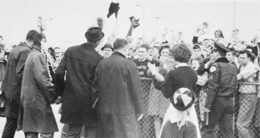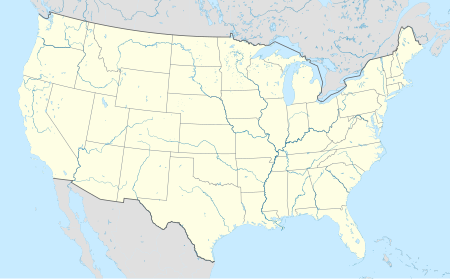The 1963 NCAA University Division basketball tournament involved 25 schools playing in single-elimination play to determine the national champion of men's NCAA Division I college basketball in the United States. It began on March 9, 1963, and ended with the championship game on March 23 in Louisville, Kentucky. A total of 29 games were played, including a third-place game in each region and a national third-place game.
 Cover from the official program | |||||
| Season | 1962–63 | ||||
|---|---|---|---|---|---|
| Teams | 25 | ||||
| Finals site | Freedom Hall Louisville, Kentucky | ||||
| Champions | Loyola Ramblers (1st title, 1st title game, 1st Final Four) | ||||
| Runner-up | Cincinnati Bearcats (3rd title game, 5th Final Four) | ||||
| Semifinalists |
| ||||
| Winning coach | George Ireland (1st title) | ||||
| MOP | Art Heyman (Duke) | ||||
| Attendance | 153,065 | ||||
| Top scorer | Mel Counts (Oregon State) (123 points) | ||||
| |||||
Loyola University Chicago, coached by George Ireland, won the national title with a 60–58 overtime victory in the final game, over the University of Cincinnati, coached by Ed Jucker. Art Heyman, of Duke University, was named the tournament's Most Outstanding Player. This tournament marked the last time that a city was host to two straight Final Fours.
Locations
| Round | Region | Location | Venue |
|---|---|---|---|
| First Round | East | Philadelphia, Pennsylvania | The Palestra |
| Mideast | Evanston, Illinois | McGaw Memorial Hall | |
| Midwest | Lubbock, Texas | Lubbock Municipal Coliseum | |
| West | Eugene, Oregon | McArthur Court | |
| Regionals | East | College Park, Maryland | Cole Field House |
| Mideast | East Lansing, Michigan | Jenison Fieldhouse | |
| Midwest | Lawrence, Kansas | Allen Fieldhouse | |
| West | Provo, Utah | Smith Fieldhouse | |
| Final Four | Louisville, Kentucky | Freedom Hall | |
Teams
| Region | Team | Coach | Conference | Finished | Final Opponent | Score | Qualification |
|---|---|---|---|---|---|---|---|
| East | |||||||
| East | Connecticut | George Wigton | Yankee | First round | West Virginia | L 77–71 | Yankee Conference champion[1] |
| East | Duke | Vic Bubas | Atlantic Coast | Third Place | Oregon State | W 85–63 | ACC tournament champion[1] |
| East | NYU | Lou Rossini | Metro NY | Regional Fourth Place | West Virginia | L 83–73 | At-large bid[2] |
| East | Pittsburgh | Bob Timmons | Independent | First round | NYU | L 93–83 | At-large bid |
| East | Princeton | Butch van Breda Kolff | Ivy League | First round | Saint Joseph's | L 82–81 | Ivy League co-champion[a][3] |
| East | Saint Joseph's | Jack Ramsay | Middle Atlantic | Regional Runner-up | Duke | L 73–59 | MAC champion[4] |
| East | West Virginia | George King | Southern | Regional third place | NYU | W 83–73 | SoCon tournament champion[1] |
| Mideast | |||||||
| Mideast | Bowling Green | Harold Anderson | Mid-American | Regional Fourth Place | Mississippi State | L 65–60 | MAC champion[4] |
| Mideast | Illinois | Harry Combes | Big Ten | Regional Runner-up | Loyola–Chicago | L 79–64 | Big Ten co-champion[b][3] |
| Mideast | Loyola–Chicago | George Ireland | Independent | Champion | Cincinnati | W 60–58 | At-large bid[2] |
| Mideast | Mississippi State | Babe McCarthy | Southeastern | Regional third place | Bowling Green | W 65–60 | SEC champion[3] |
| Mideast | Notre Dame | John Jordan | Independent | First round | Bowling Green | L 77–72 | At-large bid |
| Mideast | Tennessee Tech | Johnny Oldham | Ohio Valley | First round | Loyola–Chicago | L 111–42 | OVC champion[4] |
| Midwest | |||||||
| Midwest | Cincinnati | Ed Jucker | Missouri Valley | Runner Up | Loyola–Chicago | L 60–58 | MVC champion[5] |
| Midwest | Colorado | Sox Walseth | Big Eight | Regional Runner-up | Cincinnati | L 67–60 | Big Eight co-champion[c][3] |
| Midwest | Colorado State | Jim Williams | Independent | First round | Oklahoma City | L 70–67 | At-large bid[2] |
| Midwest | Oklahoma City | Abe Lemons | Independent | Regional Fourth Place | Texas | L 90–83 | At-large bid[2] |
| Midwest | Texas | Harold Bradley | Southwest | Regional third place | Oklahoma City | W 90–83 | SWC champion[5] |
| Midwest | Texas Western | Don Haskins | Independent | First round | Texas | L 65–47 | At-large bid[2] |
| West | |||||||
| West | Arizona State | Ned Wulk | Western Athletic | Regional Runner-up | Oregon State | L 83–65 | WAC champion[4] |
| West | Oregon State | Slats Gill | Independent | Fourth Place | Duke | L 85–63 | At-large bid[2] |
| West | San Francisco | Pete Peletta | West Coast Athletic | Regional third place | UCLA | W 76–75 | WCAC champion[3] |
| West | Seattle | Clair Markey | Independent | First round | Oregon State | L 70–66 | At-large bid[2] |
| West | UCLA | John Wooden | AAWU | Regional Fourth Place | San Francisco | L 76–75 | Big Six co-champion[d][3][6] |
| West | Utah State | LaDell Andersen | Independent | First round | Arizona State | L 79–75 | At-large bid[2] |
Bracket
* – Denotes overtime period
East region
| Quarterfinals | Semifinals | Finals | |||||||||
| Duke | 81 | ||||||||||
| NYU | 76 | ||||||||||
| NYU | 93 | ||||||||||
| Pittsburgh | 83 | ||||||||||
| Duke | 73 | ||||||||||
| Saint Joseph's | 59 | ||||||||||
| West Virginia | 77 | ||||||||||
| Connecticut | 71 | ||||||||||
| West Virginia | 88 | Third place | |||||||||
| Saint Joseph's | 97 | ||||||||||
| Saint Joseph's | 82 | West Virginia | 83 | ||||||||
| Princeton | 81* | NYU | 73 | ||||||||
Mideast region
| Quarterfinals | Semifinals | Finals | |||||||||
| Illinois | 70 | ||||||||||
| Bowling Green | 67 | ||||||||||
| Bowling Green | 77 | ||||||||||
| Notre Dame | 72 | ||||||||||
| Illinois | 64 | ||||||||||
| Loyola–Chicago | 79 | ||||||||||
| Mississippi State | 51 | Third place | |||||||||
| Loyola–Chicago | 61 | ||||||||||
| Loyola–Chicago | 111 | Mississippi State | 65 | ||||||||
| Tennessee Tech | 42 | Bowling Green | 60 | ||||||||
Midwest region
| Quarterfinals | Semifinals | Finals | |||||||||
| Colorado | 78 | ||||||||||
| Oklahoma City | 72 | ||||||||||
| Oklahoma City | 70 | ||||||||||
| Colorado State | 67 | ||||||||||
| Colorado | 60 | ||||||||||
| Cincinnati | 67 | ||||||||||
| Cincinnati | 73 | Third place | |||||||||
| Texas | 68 | ||||||||||
| Texas | 65 | Texas | 90 | ||||||||
| Texas Western | 47 | Oklahoma City | 83 | ||||||||
West region
| Quarterfinals | Semifinals | Finals | |||||||||
| UCLA | 79 | ||||||||||
| Arizona State | 93 | ||||||||||
| Arizona State | 79 | ||||||||||
| Utah State | 75* | ||||||||||
| Arizona State | 65 | ||||||||||
| Oregon State | 83 | ||||||||||
| San Francisco | 61 | Third place | |||||||||
| Oregon State | 65 | ||||||||||
| Oregon State | 70 | San Francisco | 76 | ||||||||
| Seattle | 66 | UCLA | 75 | ||||||||
Final Four
| National Semifinals | National Championship Game | ||||||||
| E | Duke | 75 | |||||||
| ME | Loyola–Chicago | 94 | |||||||
| ME | Loyola–Chicago | 60(OT) | |||||||
| MW | Cincinnati | 58 | |||||||
| MW | Cincinnati | 80 | |||||||
| W | Oregon State | 46 | Third place[7] | ||||||
| E | Duke | 85 | |||||||
| W | Oregon State | 63 | |||||||
See also
Notes

- In the Loyola vs. Mississippi State game at East Lansing, Michigan in a Mideast regional semifinal, Mississippi State, an all-white team, played despite protests from the governor and state police of Mississippi. Mississippi State overcame a state prohibition against playing integrated teams. Loyola beat Mississippi State and went on to the Mideast Region Championship game. The Loyola–Mississippi State has since been dubbed the "Game of Change".
- In the National Championship game, Loyola started four African-Americans and Cincinnati started three, marking the first time that a majority of African-Americans participated in the championship game.
- Loyola was the tenth and, as of 2022, most recent team to win the tournament in their first appearance, joining Oregon (1939), Indiana (1940), Wisconsin (1941), Stanford (1942), Utah (1944), Oklahoma State (1945), Holy Cross (1947), La Salle (1954) and San Francisco (1955).
- Loyola's first-round regional victory over Tennessee Tech, 111–42, continues to be a record margin of victory for an NCAA men's basketball tournament game. That game also remains Tennessee Tech's most recent tournament game, as the Golden Eagles have not been back since. Tennessee Tech's 59-year drought is the second longest active drought after Dartmouth, who has not made the tournament since 1959, and third all-time behind Dartmouth and Harvard, who went 66 years (1946–2012) between tournament appearances.
- In addition to Loyola, two other teams - Mississippi State and Texas Western - both made their tournament debuts. The Bulldogs had been eligible three times before (in 1959, 1961 and 1962, the last year being tied with Kentucky), but all three times had been prohibited by the state due to its prohibition against playing integrated teams. Texas Western, who were an independent team following the disbandment of the Border Conference the year prior, lost their first tournament game to in-state rival Texas, whom they had beaten 45–40 on December 29 at home. They would also make history three years later when they won the 1966 tournament with an all-black starting five.



